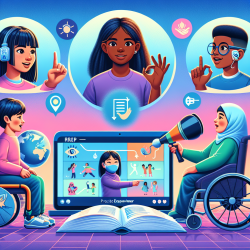As telehealth continues to gain traction in the field of speech-language pathology, the need for effective training methods becomes increasingly crucial. The research article titled A toolbox for teaching telehealth using simulation by Martin et al. (2022) offers a comprehensive guide to enhancing telehealth competencies through simulation-based training. This blog aims to distill key findings from the study and provide actionable insights for practitioners looking to improve their telehealth skills.
Why Simulation-Based Training?
Simulation-based training has been recognized as a highly effective method for teaching complex skills in a controlled, risk-free environment. According to the research by Martin et al. (2022), simulation allows practitioners to:
- Practice and refine technical skills without the risk of patient harm
- Receive immediate feedback to facilitate continuous improvement
- Develop problem-solving and decision-making skills in real-time scenarios
- Build confidence and competence before transitioning to real patient interactions
Key Components of the Telehealth Simulation Toolbox
The study outlines several key components that form the backbone of an effective telehealth simulation program:
1. Standardized Patients
Using standardized patients (SPs) allows practitioners to engage in realistic patient interactions. SPs can be trained to present specific symptoms and scenarios, providing a consistent and controlled learning environment.
2. Technology Proficiency
Mastery of telehealth platforms and related technologies is essential. The toolbox includes training modules focused on navigating telehealth software, troubleshooting technical issues, and ensuring a smooth patient experience.
3. Communication Skills
Effective communication is paramount in telehealth. The simulation exercises emphasize verbal and non-verbal communication techniques, active listening, and patient-centered care.
4. Clinical Scenarios
Practitioners are exposed to a variety of clinical scenarios that they may encounter in real telehealth sessions. These scenarios cover a wide range of conditions and complexities, preparing practitioners for diverse patient needs.
5. Feedback and Reflection
Immediate feedback from trainers and SPs, coupled with self-reflection exercises, helps practitioners identify areas for improvement and track their progress over time.
Implementing the Toolbox in Your Practice
To integrate the findings from Martin et al. (2022) into your practice, consider the following steps:
- Assess Current Skills: Conduct a self-assessment to identify areas where you need improvement.
- Set Goals: Establish specific, measurable goals for your telehealth training.
- Utilize Resources: Leverage the simulation tools and modules outlined in the research to structure your training.
- Engage in Regular Practice: Schedule regular simulation sessions to build and refine your skills.
- Seek Feedback: Actively seek feedback from trainers, peers, and SPs to facilitate continuous improvement.
Encouraging Further Research
While the toolbox provides a solid foundation, the field of telehealth is ever-evolving. Practitioners are encouraged to stay abreast of the latest research and advancements in telehealth training. Engaging in ongoing professional development and contributing to research can further enhance the quality of telehealth services.
To read the original research paper, please follow this link: A toolbox for teaching telehealth using simulation.










